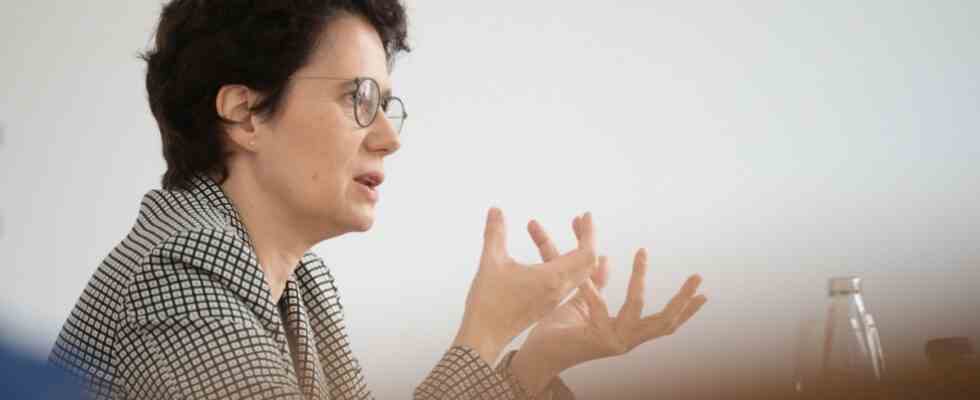The fact that the dispute over the highest judicial offices is carried out in court has long been part of everyday judicial life. But it is unusual for a justice minister to appear as a plaintiff herself in such a dispute. This Thursday, the administrative court in Stuttgart had to decide on a lawsuit brought by Marion Gentges (CDU), the chief judicial officer in the state. And what can one say: the minister suffered a crushing defeat in one of her courts.
There was a dispute about filling one of the most important judicial posts in the country. Gentges wanted to make her favorite the new president of the Higher Regional Court (OLG) in Stuttgart, Beate Linkenheil, department head in her ministry. But when it comes to filling judicial posts, there is no right to make lonely decisions. A Presidential Council, composed of nine judges, may issue an opinion on this. This is intended as a kind of quality check from the point of view of the judiciary. And that Presidential Council found Linkenheil’s candidates unconvincing, at least compared to another candidate: He suggested Andreas Singer, who, as President of the Stuttgart Regional Court, had a “relevant lead in experience” over Linkenheil.
The dispute may continue
The judges’ law actually has a solution ready if the minister and the presidential council are at odds with each other. Then the matter goes to the judge selection committee, which is at least halfway democratically legitimized because there are eight judges and a lawyer as well as six members of the state parliament. But Gentges didn’t want to deal with another body, because she considered the veto of the Presidential Council to be illegal – and appealed to the administrative court.
The court has now dismissed her claim as inadmissible. And that’s only for the reason that the minister has left the path provided for by law. You first have to turn on the judge selection committee and wait for its decision – the shortcut via the administrative court is simply not provided. In the words of Friedrich Klein, chairman of the chamber of the administrative court: “The legal protection against the counter-proposal of the Presidential Council is not permissible.”
It is unclear whether the dispute is over. The Ministry could still go before the Administrative Court. Should the verdict remain “inadmissible” there, Gentges could start a new attempt after the end of the election procedure. Whether the ministry’s authority over personnel had been violated can only be determined after a decision has been made by the judge selection committee, said Klein.
Linkenheil and Singer will have to wait, the dispute is pending resubmission. At the same time, he reveals a view of the difficult situation in which judicial elections take place everywhere, even if the procedures differ from country to country. How far can political influence go in personnel decisions in the judiciary? How effective are the protective mechanisms against partisan encroachment? How is it ensured that only the best get a chance?
It is also about the independence of the judiciary
If the Presidential Council is intended as a firewall against the political march on judicial personnel, then it can only be effective if its role is broad. At this point, the parties before the administrative court were, unsurprisingly, miles apart.
The representative of the ministry, Alexander Kees, wanted to reduce the body to a mere legality check. He has “no own selection discretion”, but only a control function. “He has prevented the minister from appointing whoever she thinks is best,” he lamented. Christian Bracher, lawyer for the Presidential Council, saw it the other way around. Sure, he has a control function – but that consists in the fact that he can comment on the professional and personal suitability of the applicants. So a right of co-decision after all.
The administrative court did not have to decide on this question, but with a look at history, the chairman Klein made it clear that the judiciary should rather be expected to play a strong role in the selection of judges. Up until 1973, the Presidential Council had the opportunity to give its opinion on personal matters – but without obligation, the minister could appoint whomever he wanted. But in the spirit of the time, a reform was launched that would rebalance the weights – less power for the government, more influence for the judiciary. “We have to be very careful to ensure the independence of the judiciary,” Klein quoted the then Minister of Justice as saying.
Perhaps the politically controversial personal details of the minister could be an occasion to think fundamentally about the system for electing judges. On the eve of the trial, Anne Sanders, a law professor in Bielefeld, gave a lecture on this topic in Karlsruhe. She considers the German system to be in great need of improvement, although she does not give the selection systems of other countries particularly good marks. This is especially true of the much-vaunted judiciary councils that exist in Italy and other southern European countries. They too could not have prevented a takeover by politicians.
Her suggestion: When selecting judges, any concentration of power should be prevented – be it on a single body or on a minister.

